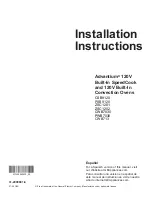
17
Practical cooking tips and suggestions
Meat, poultry, fish
Cookware
Any heatproof cookware can be used.
Always place cookware in the centre of the shelf.
Hot glass cookware should be placed on a dry dishcloth. The
glass could shatter if rested on a wet or cold surface.
Practical tips for roasting
The roasting results will depend on the type and quality of the
meat concerned.
When roasting lean meats, 2 or 3 tablespoonfuls of liquid
should be added. When braising meat, 8 to 10 tablespoonfuls
of liquid should be added, depending on the size of the piece
of meat concerned.
Turn pieces of meat over halfway through cooking.
Once the roast is ready it should be allowed to rest for
10 minutes in the oven, with the power switched off and the
door closed. This allows the juices in the meat to distribute
themselves most evenly.
Practical tips for grilling
Always grill food with the oven door closed.
Ensure the pieces of meat to be grilled are of equal thickness,
where possible. The pieces should be at least 2 to 3 cm thick,
so that it retains all its juices and browns evenly. Only season
steaks after they have been grilled.
Place the steaks directly on the shelf. When grilling a single
piece of meat, place it in the centre of the shelf. This will
produce the best results. The enamel tray should be inserted at
level 1. The tray will help keep the oven clean by catching any
meat juices.
The meat or fish should be turned over after two thirds of the
cooking time has elapsed.
The grill switches on and off automatically. This is normal. The
frequency with which this occurs depends on the power level
which has been selected.
Cream puffs
Baking tray
2
%
190-210
30-40
Macaroons
Baking tray
3
%
110-130
30-40
Aluminium tray + flat oven tray*
2+3
2
100-120
35-45
Aluminium tray + universal deep
tray*
2+4
2
100-120
35-45
Pastries
Level
Type of heating Temperature
in °C
Cooking time,
minutes
* When cooking on two levels, always place the aluminium tray on the lower level and the universal deep tray on the upper level.
Extra baking trays may be obtained as optional accessories from specialist retail outlets.
If you want to use your own recipe.
You can use a similar one listed in the cooking table.
How to check if your sponge cake is ready.
Ten minutes before the end of the cooking time indicated in the recipe, test
the thickest part of the cake with a thin wooden skewer. The cake is ready
when the skewer comes out clean, with no traces of cake batter left on the
skewer.
The cake is too flat.
Next time, try using less liquid or reduce the oven temperature by
10 degrees. Ensure you mix the batter according to the times given in the
recipe.
The cake has a peaked centre, but the edges have
shrunken.
Do not grease the tin. Once the cake is ready, use a knife to carefully remove
it from the tin.
If the cake is too brown on top.
Position the cake deeper in the oven, reduce the oven temperature and bake
it for longer.
The cake is too dry.
Use a skewer to make small holes in the finished cake. Pour a few drops of
fruit juice or alcohol over the cake. Next time, increase the oven temperature
by 10 degrees and reduce the cooking time.
The bread or cake (fruit cake, for example) looks
fine on the outside but still has soft (soggy) areas
inside.
Next time, use less liquid and leave the product for a little longer in the oven,
at a lower temperature. The bases of cakes with juicy toppings should be
baked first on their own. Then sprinkle chopped almonds or breadcrumbs on
the base before adding the topping. Follow the recipe and observe the
cooking times.
Biscuits are not evenly browned.
Select a lower temperature; the biscuits will be browned more uniformly.
Bake more delicate pastries with top and bottom heating
%
on one level.
Overhanging greaseproof paper may also affect air circulation. Always trim it
to fit the baking tray.
Products have been baked on different levels.
Biscuits on the upper tray are darker than those on
the lower tray.
Always use the hot air function
2
when baking products on different levels.
Although several baking trays may be placed in the oven at the same time,
this does not mean that they will necessarily all be ready at the same time.
Baking moist cakes produces condensation.
Condensation may form when baking. Some of this moisture may evaporate
via the door handle, and droplets of condensation may form on the control
panel or on the front of nearby kitchen units. The oven is physically designed
with this in mind.








































